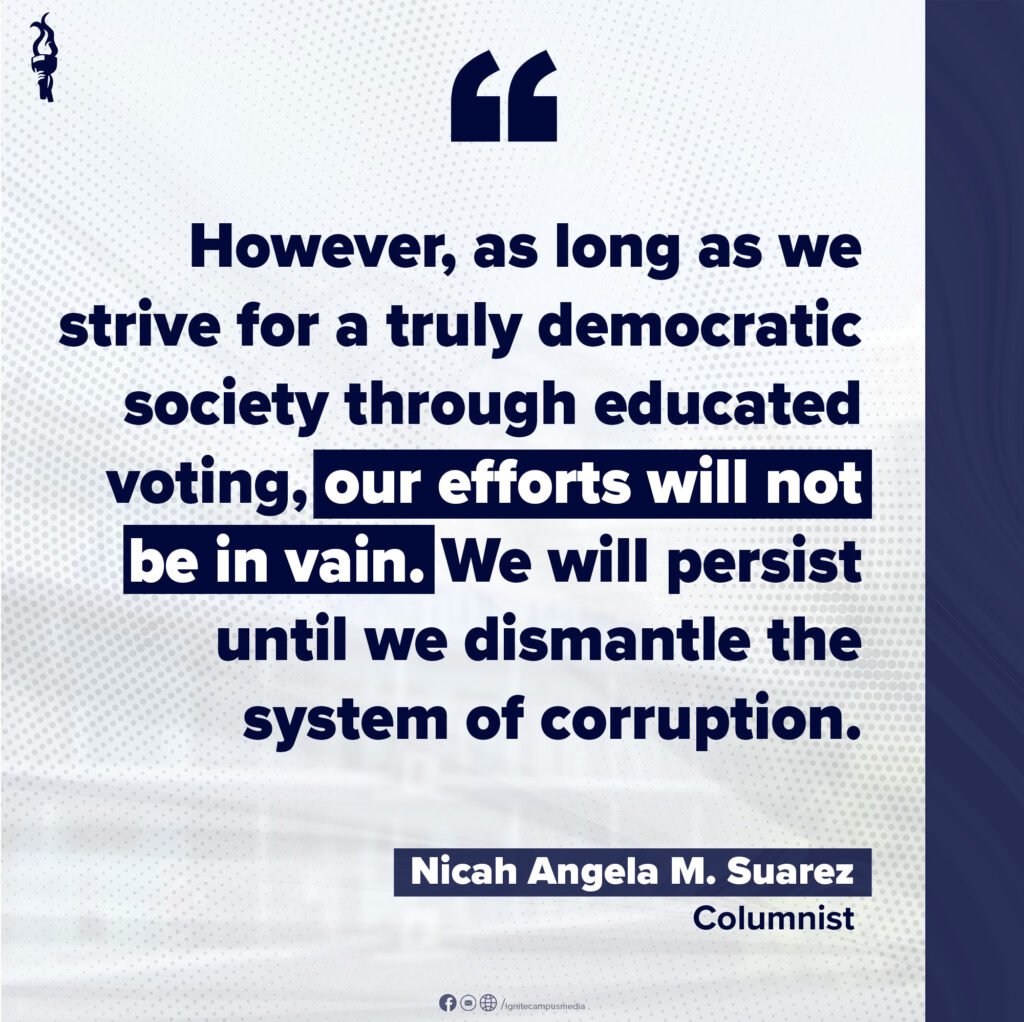
Band-Aid Solutions and Inaction
| Nicah Suarez
Layout by Elijah Jardinez
Some people don’t actually know the difference between solving and fixing an actual problem. Fixing a problem is finding a short-term solution, while solving focuses on the root cause of the issue. The Commission on Elections (Comelec) is a great example where it’s still in a situation it was decades ago.
One of the nation’s systematic failures is continuing to promote political patronage. Our system allows politicians to create their group of supporters and continue to utilize ayuda to gather support, regardless of their party and ideas. This was also used similarly to vote-buying, where non-supporters don’t receive any aid from the local government.
This is a long-standing issue and has yet to be effectively addressed. Social welfare programs such as AICS, TUPAD, and AKAP have reached the point that it was a premature campaign scheme way before the election period.
The ineffective system of focusing on individual candidates and personal gain, rather than developing programmatic, strong political parties, weakens the integrity of the electoral process. The destroyed alliance between President Ferdinand “Bongbong” Marcos Jr. and Vice President Sara Duterte proves how the multi-party plurality system in the Philippines contributes to weak party cohesion, as it became a competition between the two influential families.
I noticed how weak Comelec’s enforcement mechanisms have been. It was unable to discourage vote buying. Their response has been seriously lacking. Comelec-Cordillera Director Julius Torres even admitted that it was challenging for them to investigate if there were no witnesses to testify.
As they only rely on citizens’ reports, which Nestor Banuag Jr., an electoral reform advocate and a chairperson of the National Citizens’ Movement for Free Elections (NAMFREL), stated that some voters are hesitant to make a report due to safety concerns.
This shows how corrupt politicians have utilized government programs for personal gain and used aid as a temporary solution. The main problem is the corruption and the politicians’ promises of help and financial aid to save Filipinos from life’s obstacles. The recipients of the social welfare programs are not even the supposedly target demographics, but the supporters of local politicians.
Comelec has not demonstrated the capacity or resolve to prosecute offenders and secure convictions, as the problem persists. Despite their so-called “solution” to the problem, they just show their inability to provide clear and decisive leadership on this critical issue.
The 2025 midterm elections showed an increasingly alarming and questionable concern that Comelec hasn’t fully responded to yet. Illegal campaigning in several places in the Philippines was still prevalent on the day of the elections. Sample ballots were scattered and distributed in secret near precincts. Comelec could have prevented it if it had been stricter with stronger probation and enforcement.
There were also cases of overvotes and inaccurate voting receipts—a problem since the old vote-counting machines. It’s eroding public trust. Comelec has three years to plan and prepare, but it has always led to disappointment. This procedure has existed for decades, yet it hasn’t been perfected.
To Comelec, they need to stop putting on a show of their ineffectiveness with temporary and weak measures by placing a band-aid on an obviously big wound. Statements are not enough for the public, we need proof to lessen the confusion. Systemic flaws require urgent, comprehensive reform. This includes reorganizing and fixing the election rulebook “Omnibus Election Code of 1985”, as the European Union Election Observation Mission (EU EOM) observed how messy it is, and labeled it as outdated.
There’s no doubt that Comelec must be held accountable. The future of our country’s democracy not only depends on the ability of Comelec to acknowledge its failures and provide an actual solution, but it also needs educated voters. We need to build a strong foundation for voters’ education, empowering citizens to critically analyze information and make informed choices at the ballot box.
It is quite tiring to watch the same drama our country has been in over the years. This time, a different storyline and characters. However, as long as we strive for a truly democratic society through educated voting, our efforts will not be in vain. We will persist until we dismantle the system of corruption.
The institution must transform into a truly independent, effective, and accountable institution to stop damaging the public trust and the very foundations of the democratic process.